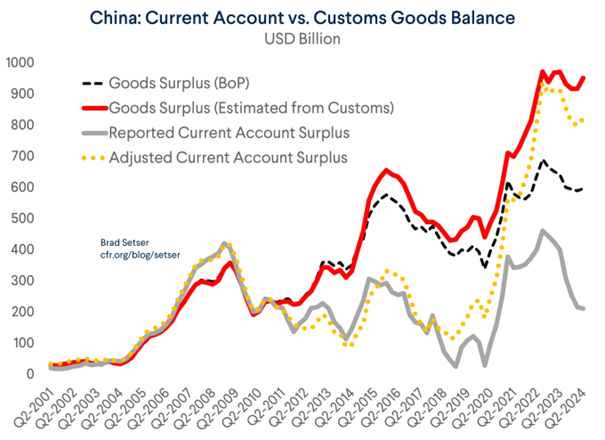Brad Setser has been diligently cross-checking the external accounts of China. For purposes of thinking about how policymakers are trying to snatch aggregate demand across borders, the trade balance is key.
Source: Setser/CFR.
This means that as of Q2, China’s trade surplus might be as much as 50% larger than BoP statistics indicate. Note that focusing on dollar terms might be particularly misleading if export prices are falling. Import prices of goods from China have fallen about 4% since April of 2022 (through July 2024). This doesn’t seem like a big drop, but then the core PPI has risen by about 6.4% over that same period.
So, expect more stress on global imbalances…

‘Factoryless is, however, a misnomer in this case. The actual factories are in China (they just aren’t owned by a foreign company operating in China) and they are producing under contract for a foreign firm.’ – Brad Setser
I nice example is the production of iPhones which are assembled in China. Some end up being exported but damn it – Chinese people buy iPhones too. And unlike Bruce Hall they realize that these Apple Inc. products are not fruit.
But the production of iPhones raises another question – isn’t Customs data capturing gross sales and not value-added. For iPhones, the implications are rather enormous.
Setser’s analysis is quite embarrassing for the IMF, assuming there isn’t some major mistake in what he has written. That’s because the IMF’s errors seem quite glaring. Failure to account for a change in China’s accounting procedures. Failure to reconcile economic fundamentals across countries with their own conclusions about current account and trade balances.
I’ve worked under the discipline of a large global model, and I’ve seen what happens when forecasts don’t match up – you notice. Mistakes are generally pretty obvious. The second iteration of forecasts in a forecasting round is mainly aimed at reconciling fundamentals across countries, after mismatches are discovered in the first round. The IMF’s failure to reconcile fundamentals looks almost willful.
Doesn’t mean Setser is right about the fundamentals, but the IMF ignoring China’s accounting change makes me think they could get other things wrong, too.
It’s possible IMF authors are seeing what they want to see. Balance is a big deal for the IMF, so “imbalances receding” is a happy conclusion. It’s also possible that what Setser has uncovered is not an innocent mistake. China has recently changed its method of reporting unemployment, with the result that the youth unemployment rate is now lower. Setser reports that China has changed its method of reporting the current account balance, with the result that the surplus is lower; China’s current account surplus is a matter of contention with trade partners. China has in the past put considerable pressure on international organizations to prevent criticism of China.
National income accounting with vertically integrated multinationals has all sorts of potential issues including the specific issue Brad raises. Also the top of my mind:
(1) Transfer pricing distortions; and
(2) Gross revenue versus net revenue accounting when a large part of the former is from imported components and domestic value added is modest.
Brad in his other writings has highlighted both (1) and (2).
Off topic – shadow transition team for Trump:
https://www.politico.com/news/2024/08/29/trump-transition-plan-afpi-00176674
A fake wrestling personality is heading up a shadow transition team for Trump’s potential second presidency. Not Hulk Hogan, deapite his ability to rip t-shirts. It’s Linda McMahon. Yep, she’s back.
There are two motivating factors at work. One is that McMahon gains political clout. She has run for the Senate twice, losing both times, and also headed the SBA for Trump. The other is avoiding the embarrassing half year of drift suffered by Trump’s first administration due to his inexperience and disinterest in the real work of government. Apparently, a former WWF exec is better qualified to organize a presidential administration than is the head of The Trump Organization.
I don’t find any evidence that McMahon is preparing a policy document, but people matter more than documents. She’s putting herself in charge of people.
The story listed a few other people including Kudlow the Klown. If Kudlow is put in charge of economic policy, expect an utter disaster.
I have a tendency to absent-mindedly forget to check Setser’s blog, so I always appreciate these Setser posts. He always has something contributive to say.